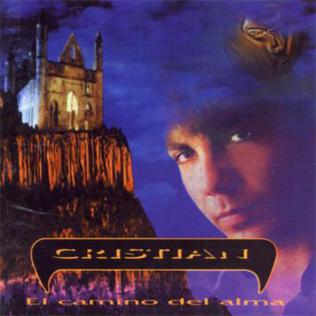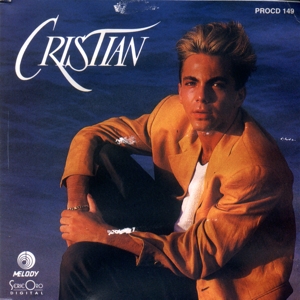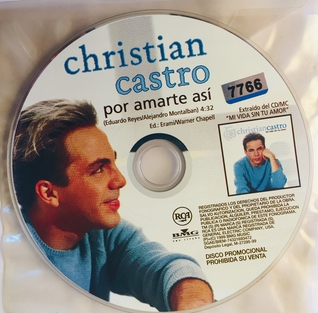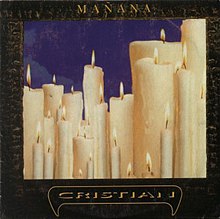
Alberto Aguilera Valadez, known professionally as Juan Gabriel, was a Mexican singer, songwriter and actor. Colloquially nicknamed as Juanga and El Divo de Juárez, Juan Gabriel was known for his flamboyant style, which broke barriers within the Latin music industry. Widely considered one of the best and most prolific Mexican composers and singers of all time, he has been referred to as a pop icon.

Christian Sáinz Valdés Castro, known professionally as Cristian Castro or Cristian, is a Mexican pop singer. He is the son of actors Veronica Castro and Manuel "El Loco" Valdés, and nephew of actors Ramón Valdés and Germán "Tin-Tan" Valdés.
Mexican pop is a music genre produced in Mexico, particularly intended for teenagers and young adults.

"No Me Queda Más" is a song by American singer Selena on her fourth studio album, Amor Prohibido. It was released as the third single from the album in October 1994 by EMI Latin. "No Me Queda Más" was written by Ricky Vela, and production was handled by Selena's brother A.B. Quintanilla. A downtempo mariachi and pop ballad, "No Me Queda Más" portrays the ranchera storyline of a woman in agony after the end of a relationship. Its lyrics express an unrequited love, the singer wishing the best for her former lover and his new partner.

"Bidi Bidi Bom Bom" is a song recorded by American Tejano singer, Selena. It was released as the second single from her fourth studio album, Amor Prohibido (1994). Originally written about a cheerful fish swimming freely in the ocean, the song's title is an onomatopoeic phrase suggesting the palpitating heartbeat of a person lovestruck by the object of their affection. "Bidi Bidi Bom Bom" was written by Selena and her backup vocalist and dancer Pete Astudillo.
The 9th annual Billboard Latin Music Awards, which honor the most popular albums, songs, and performers in Latin music, took place May 9 in Miami. Winners are determined by the actual sales and radio airplay data that informs Billboard's weekly charts, including Top Latin Albums, and radio charts, including Hot Latin Tracks, during a one-year period from the issue dated Feb. 17, 2001 through the Feb. 9, 2002, issue.

El camino del alma is the third studio album released by Mexican Latin pop singer Cristian Castro. It was released on August 15, 1994. Its major hit was the cover Juan Gabriel's "Mañana, Mañana". The album was nominated in 1996 for Best Latin Pop Album in the Grammy Awards and a Lo Nuestro Award for Pop Album of the Year.

"Nunca Voy a Olvidarte" is a song written by Roberto Belester and first recorded by Mexican grupero band Bronco for their album Salvaje y Tierno (1991). In the song, the protagonist is leaving and vows to never forget the time he spent with his lover. In 1993, Mexican singer-songwriter Cristian Castro covered the song on his album, Un Segundo en el Tiempo. Castro's version peaked at number-one on the Billboard Hot Latin Songs chart in the United States became his first number-one single.

"Lo Mejor de Mí" is a song written and produced by Rudy Pérez and first recorded by Spanish singer Juan Ramon for his second studio album Por Haberte Amado Tanto (1990). In the song, the protagonist tells his lover how he gave his best despite not meeting his lover's expectation. In 1997, Mexican recording artist Cristian Castro covered the song for his fifth studio album Lo Mejor de Mí which Pérez also produced and arranged. Castro's version peaked at number-one on the Billboard Hot Latin Songs and the Billboard Latin Pop Songs charts in the United States. The song received a Billboard Latin Music Awards and a Lo Nuestro nomination for Pop Song of the Year. Pérez earned the American Society of Composers, Authors and Publishers award in the Pop/Ballad field.

"Por Amarte Así" is a song written by Alejandro Montalbán and Eduardo Reyes and performed by Mexican recording artist Cristian Castro. It was produced by Kike Santander and released in 2000 as the fourth single from his sixth studio album Mi Vida Sin Tu Amor (1999). Lyrically, the song is about a man who promises to keep loving his lover even though she is gone. In the United States, it peaked at number three and two on the Billboard Hot Latin Songs and Latin Pop Songs charts and received a Billboard Latin Music nomination for Pop Track of the Year. "Por Amarte Así" was the fifth best-performing Latin single of 2001 in the United States.

Viva el Príncipe is the thirteenth studio album by Mexican recording artist Cristian Castro, released on 30 November 2010 by Universal Music Latino. It is a tribute album to Mexican singer José José, Castro's musical idol. The album was produced by Rafael Pérez-Botija who also produced for José José. Viva el Príncipe covers twelve songs by José José and includes a poem recited by Castro's idol. Recording took place on August 2010 at The Hit Factory Criteria in Miami, Florida.

Enamorada de Ti is the second remix album by American Tejano singer Selena. It was released posthumously on 3 April 2012 through Capitol Latin and Q-Productions. Enamorada de Ti was produced by Sergio Lopes, Leslie Ahrens, Andres Castro, Moggie Canazio, Cesar Lemons and Chilean record producer Humberto Gatica. Gatica had the idea of modernizing songs recorded by Selena into today's popular music genres. Selena's family had already been working on a similar idea, but they set it aside in favor of Enamorada de Ti, which had gained the approval of Capitol Latin. The selection of artists to sing duets with Selena began in late summer 2011. Gatica and Selena's family chose American singer and actress Selena Gomez, Puerto Rican singer Don Omar, Samuel "Samo" Parra from the Mexican rock band Camila, Mexican singer Cristian Castro, Spanish DJ mixer Juan Magan, and the Carlos Santana band, while the remaining songs selected were remixed.

"Amor" is a song written and performed by Mexican singer Cristian Castro and produced by Daniel Freiberg. It was released as the lead single for Castro's fourth studio album El Deseo de Oír Tu Voz in 1995 by Melody Records. It is an acoustic pop rock song in which the singer asks love to give him a chance. In the United States, it reached the summit of the Billboard Hot Latin Songs and spent 11 weeks at this position. In 1996, it ended as the second-best performing Latin song of the year in the country. "Amor" also reached number one on the Latin Pop Songs compiled by the same publication. A music video for "Amor" was filmed in Rome, Italy and directed by Castro, featuring the artist performing various stunts in the city.

"No Podrás" is a song written and composed by Alejandro Zepeda and Peter Skrabak, originally recorded by Mexican recording artist Cristian Castro. Lyrically, the song describes the end of a relationship between two lovers where the protagonist tells the lover that she will not forget how much he loved her. The song was released by Fonovisa Records as the lead single from Castro's debut studio album Agua Nueva (1992). It peaked at number three on the US Billboard Hot Latin Songs chart. It was well received by music critics, despite negative reception of its parent album.

Joyas Prestadas: Pop and Joyas Prestadas: Banda are the 12th and final studio albums by recording artist Jenni Rivera, released on November 21, 2011 by Fonovisa Records. Joyas Prestadas consists of a double album with eleven cover songs, each recorded with two distinct styles of music. The first half being recorded in pop, while the second was recorded in the Regional Mexican subgenre of banda. The album was produced by Enrique Martinez. According to Rivera, the songs she chose to cover were those she was enamored with while working as a cashier in a record store.

"Vuélveme a Querer" is a song written and produced by Jorge Avendaño Lührs and performed by Mexican recording artist Cristian Castro for the compilation album Boleros: Por Amor y Desamor (1995). The song speaks of a protagonist who yearns for his lover to return. In the United States, the song peaked at number two on the Billboard Hot Latin Songs and number one on the Billboard Latin Pop Songs chart. It received a Billboard Latin Music Award and a Lo Nuestro nomination for Pop Song of the Year the following year. Avendaño received an award in the Pop/Rock category at the American Society of Composers, Authors and Publishers (ASCAP) Awards of 1997
The 7th Lo Nuestro Awards ceremony, presented by the Univision, honored the best Latin music of 1994 and 1995 and took place on May 18, 1995, at a live presentation held in Miami, Florida. The ceremony was broadcast in the United States and Latin America by Univision.

Lo Mejor de...Selena is a double disc compilation album by American singer Selena. It was released posthumously in the United States on March 31, 2015, by Capitol Latin and Universal Music Latin Entertainment. The album was released after the commercial and chart success of Enamorada de Ti (2012), which featured several Latin music acts lending their voices for the remix album. The recording features six number one United States Billboard Hot Latin Songs chart singles by the singer—"Buenos Amigos", "Donde Quiera Que Estés", "Amor Prohibido", "Bidi Bidi Bom Bom", "No Me Queda Más", "Fotos y Recuerdos", and the US Billboard Latin Pop Airplay chart single "I Could Fall in Love".

"Con Tu Amor" is a song written by Daniel Garcia and Mario Schajris and performed by Mexican singer Cristian Castro. It was released as the second single from his album El Camino del Alma. It became his second number one song on the Billboard Latin Pop Airplay chart in 1995. It was recognized as one of best-performing songs of the year at the 1996 ASCAP Latin Awards. A live version of the song was included on Castro's album En Primera Fila: Día 2 (2014). The song was covered by Cuban salsa singer Guianko on his album Mi Forma de Sentir (1998).
"Amarte a Ti" is a song written by Walter Arenzon and co-written and produced by Daniel Freiberg and performed by Mexican singer-songwriter Cristian Castro from his fourth studio El Deseo de Oír Tu Voz (1996). It was released as the second single from the album. It became his third number-one song on the Billboard Hot Latin Tracks chart and his sixth number-one on the Latin Pop Airplay chart. It was recognized as on the best-performing songs of the year at the 1997 BMI Awards. The song was later covered by Dominican Republic merengue band Sin Fronteras on their album Abriendo Caminos (1996) and recorded a music video for it.
















